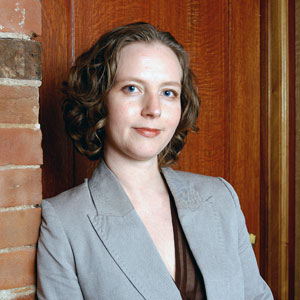 |
Like many students with an interest in health care, Meredith Schwartz believed that a career in medical science was the path for her. As she studied, however, the questions she began asking took her in a decidedly different direction.
ĆI thought I wanted to do medical research,ā says Schwartz, reflecting on her time as an undergraduate at the University of Toronto. ĆBut the questions jumping out at me werenĆt really research-driven, but ethically-driven.ā
Following those questions led Schwartz towards a branch of philosophy known as bioethics. ĆMedicine asks Ćhow do we fix this?Ćā she explains. ĆBioethics asks, Ćshould we do this?Ć ĆIs this the best way to do this?Ć ĆWhat are the unintended consequences?Ćā Working with the Hospital for Sick Children in Toronto and helping guide a friend through cancer treatment solidified SchwartzĆs commitment to understanding the ethics that drive our health care system.
Having completed her MasterĆs degree in Philosophy at pilipiliĀž» and working on her PhD, SchwartzĆs path has now led her to the 2006 Trudeau Foundation Scholarship. The award, presented yearly to 15 doctoral students in the social sciences and humanities, is worth up to $200,000 and presents the unique opportunity to address the major issues affecting our society and to interact with scholars from across the country.
Wide-ranging ethical questions
SchwartzĆs research will examine how adult genetic screening for certain diseases Ć cancers, cardiovascular disease, neurodegenerative disorders Ć affects social attitudes towards personal responsibilities. While genetic screening is not widely available yet, its popularity in some private clinics brings up a wide range of ethical questions, in particular concerning a personĆs responsibilities once they know that they are susceptible to these diseases.
ĆPeople sometimes talk about a right to know about their genetic futures so that they can take responsibility for their health,ā she says. ĆI would like to clarify what kinds of responsibilities they may have to stay healthy.Ā I am especially concerned to ensure that notions of responsibility do not lead to blaming patients who become ill after a genetic diagnosis.ā Schwartz also hopes to help understand feelings of guilt about passing genetic disorders onto children, even if the children were born prior to diagnosis.
Academic excellence and social justice
Schwartz believes that the opportunities that sheĆs had Ć from the awards that sheĆs won to the scholarly pursuits sheĆs undertaken Ć would not have been possible without the support and enthusiasm of DalhousieĆs faculty and staff. ĆI really enjoy studying here,ā she says. ĆThe philosophy department is incredibly supportive of students and theyĆre great mentors. I really donĆt think that I would have received the awards I have at another school.ā
Her supervisor, Dr. Susan Sherwin, returns that praise. ĆI am very pleased to have the opportunity to work with Meredith,ā says Dr. Sherwin. ĆShe represents an outstanding example of academic excellence combined with a strong commitment to social justice.ā
This fall, Schwartz will work at the IWK to gather information on genetic observation. SheĆs also attending a conference in Beijing, linking her research to a larger discussion on the impact of expectations on decision making. From there, she will start writing her thesis with the hopes of completing it within the next two years Ć contingent, of course, on whatever new questions she comes across.
